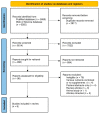Effect of Vitamin D Supplementation on Depression in Adults: A Systematic Review of Randomized Controlled Trials (RCTs)
- PMID: 36839310
- PMCID: PMC9963956
- DOI: 10.3390/nu15040951
Effect of Vitamin D Supplementation on Depression in Adults: A Systematic Review of Randomized Controlled Trials (RCTs)
Abstract
Vitamin D is a nutrient potentially beneficial in the treatment of depression. The study aimed to carry out a systematic review of the studies assessing the influence of vitamin D supplementation on depression within Randomized Controlled Trials (RCTs). The systematic review was prepared on the basis of the Preferred Reporting Items for Systematic Reviews and Meta-Analyses (PRISMA) guidelines, and was registered in the International Prospective Register of Systematic Reviews (PROSPERO) database (CRD42020155779). The peer-reviewed studies available within PubMed or Web of Science databases until September 2021 were taken into account. The number of screened records was 8514, and 8 records were included. Two independent researchers conducted screening, including, reporting, and risk of bias assessment using the revised Cochrane risk-of-bias tool for randomized trials. The included studies presented a population of patients with major depressive disorders or general depression, as well as bipolar depression or postpartum depression. The majority of included studies were conducted for 8 weeks or 12 weeks, while one study was conducted for 6 months. Within the large number of included studies, a daily dose of 1500 IU, 1600 IU, or 2800 IU was applied, while within some studies, a vitamin D dose of 50,000 IU was applied weekly or biweekly. Among applied psychological measures of depression, there were various tools. In spite of the fact that the majority of included studies (five studies) supported the positive effect of vitamin D supplementation for the psychological measure of depression, for three studies the positive influence was not supported. A medium risk of bias was indicated for six studies, while a high risk of bias was defined for only two studies, due to deviations from the intended interventions and in measurement of the outcome, as well as for one study, also arising from the randomization process and due to missing outcome data. Based on conducted assessment, it should be emphasized that there are only four studies supporting the positive influence of vitamin D supplementation for the psychological measure of depression of the medium risk of bias, while two studies of a medium risk of bias did not support it. Taking this into account, the conducted systematic review is not a strong confirmation of the effectiveness of vitamin D supplementation in the treatment of depression.
Keywords: Randomized Controlled Trials (RCTs); depression; depressive symptoms; diet therapy; major depressive disorder; supplement; supplementation; vitamin D.
Conflict of interest statement
The authors declare no conflict of interest.
Figures
References
-
- Chand S.P., Arif H. StatPearls. StatPearls Publishing; Treasure Island, FL, USA: 2022. Depression.
-
- The American Psychiatric Association’s Diagnostic Statistical Manual of Mental Disorders, Fifth Edition (DSM-5) [(accessed on 27 December 2022)]. Available online: https://dsm.psychiatryonline.org/doi/book/10.1176/appi.books.97808904255.... - DOI
-
- National Research Council (US) Institute of Medicine (US) Committee on Depression, Parenting Practices. The Healthy Development of Children . Depression in Parents, Parenting, and Children: Opportunities to Improve Identification, Treatment, and Prevention. In: England M.J., Sim L.J., editors. The Etiology of Depression. Volume 3 National Academies Press (US); Washington, DC, USA: 2009. - PubMed
Publication types
MeSH terms
Substances
LinkOut - more resources
Full Text Sources
Medical


